Ecological Entanglements in the Anthropocene
Ecocritical Theory and Practice
Series Editor: Douglas A. Vakoch, California Institute of Integral Studies, USA
Advisory Board
Joni Adamson, Arizona State University, USA; Mageb Al-adwani, King Saud University, Saudi Arabia; Bruce Allen, Seisen University, Japan; Hannes Bergthaller, National Chung-Hsing University, Taiwan; Zlia Bora, Federal University of Paraba, Brazil; Izabel Brando, Federal University of Alagoas, Brazil; Byron Caminero-Santangelo, University of Kansas, USA; Jeffrey J. Cohen, George Washington University, USA; Simo Farias Almeida, Federal University of Roraima, Brazil; Julia Fiedorczuk, University of Warsaw, Poland; Camilo Gomides, University of Puerto Rico Rio Piedras, Puerto Rico; Yves-Charles Grandjeat, Michel de Montaigne-Bordeaux 3 University, France; George Handley, Brigham Young University, USA; Isabel Hoving, Leiden University, The Netherlands; Idom Thomas Inyabri, University of Calabar, Nigeria; Serenella Iovino, University of Turin, Italy; Adrian Ivakhiv, University of Vermont, USA; Daniela Kato, Zhongnan University of Economics and Law, China; Petr Kopeck, University of Ostrava, Czech Republic; Mohammad Nasser Modoodi, Payame Noor University, Iran; Patrick Murphy, University of Central Florida, USA; Serpil Oppermann, Hacettepe University, Turkey; Rebecca Raglon, University of British Columbia, Canada; Anuradha Ramanujan, National University of Singapore, Singapore; Christian Schmitt-Kilb, University of Rostock, Germany; Marian Scholtmeijer, University of Northern British Columbia, Canada; Heike Schwarz, University of Augsburg, Germany; Murali Sivaramakrishnan, Pondicherry University, India; Scott Slovic, University of Idaho, USA; J. Etienne Terblanche, North-West University, South Africa; Julia Tofantuk, Tallinn University, Estonia; Jennifer Wawrzinek, Free University of Berlin, Germany; Cheng Xiangzhan, Shandong University, China; Yuki Masami, Kanazawa University, Japan; Hubert Zapf, University of Augsburg, Germany
Ecocritical Theory and Practice highlights innovative scholarship at the interface of literary/cultural studies and the environment, seeking to foster an ongoing dialogue between academics and environmental activists.
Recent Titles
Ecological Entanglements in the Anthropocene , edited by Nicholas Holm and Sy Taffel
Ecocriticism, Ecology, and the Cultures of Antiquity , edited by Christopher Schliephake
Ecotheology and Nonhuman Ethics in Society: A Community of Compassion , edited by Melissa Brotton
The Ethics and Rhetoric of Invasion Ecology , edited by James Stanescu and Kevin Cummings
Ecological Entanglements in the Anthropocene
Nicholas Holm and Sy Taffel
Lexington BOOKS
Lanham Boulder New York London
Published by Lexington Books
An imprint of The Rowman & Littlefield Publishing Group, Inc.
4501 Forbes Boulevard, Suite 200, Lanham, Maryland 20706
www.rowman.com
Unit A, Whitacre Mews, 26-34 Stannary Street, London SE11 4AB
Copyright 2017 by Lexington Books
All rights reserved . No part of this book may be reproduced in any form or by any electronic or mechanical means, including information storage and retrieval systems, without written permission from the publisher, except by a reviewer who may quote passages in a review.
British Library Cataloguing in Publication Information Available
Library of Congress Cataloging-in-Publication Data Available
ISBN 978-1-4985-3569-4 (cloth : alk. paper)
ISBN 978-1-4985-3570-0 (electronic)
 The paper used in this publication meets the minimum requirements of American National Standard for Information SciencesPermanence of Paper for Printed Library Materials, ANSI/NISO Z39.48-1992.
The paper used in this publication meets the minimum requirements of American National Standard for Information SciencesPermanence of Paper for Printed Library Materials, ANSI/NISO Z39.48-1992.
Printed in the United States of America
Contents
Sy Taffel and Nicholas Holm
Sean Cubitt
Nicholas Holm
Charles Dawson
Jacob Otter
Victoria Grieves
Anne OBrien
Sharon Stevens
Sita Venkateswar
Christopher Orchard and James Holcombe
Octavia Cade
Gareth Stanton
David Orchard and Peter Orchard
Sy Taffel
This anthology began its life as a conference, Working with Nature: Ecological Entanglements in the Anthropocene, which was held in April 2015 at the Manawatu campus of Massey University in Aotearoa New Zealand. Initially envisioned as a small-scale symposium event, we were taken aback by the high levels of interest among those eager to discuss and debate the implications of the Anthropocenic moment, and our small event gradually shifted to a larger two-day format that provided a forum for a range of voices and perspectives addressing the different ways in what we once thought of as natural and human worlds might relate to one another. This book would never have existed without both the support of various institutions and the enthusiasm of the local academic community which made that event possible.
We would therefore like to thank Massey Universitys School of English and Media Studies, College of Humanities and Social Sciences and, especially, the W.H. Oliver Humanities Research Academy (and its director, Kerry Taylor) for their generous support of the initial event. After the fact, the Massey University Political Ecology Research Centre also provided support that helped make this book possible.
We would also like to thank all those who presented at the conference Ozan Alakavuklar, Cameron Boyle, Sean Cubitt, Charles Dawson, Caroline Depatie, Ali East, Victoria Grieves, Dinah Hawken, Susie Lachal, Jenny Mauger, Sasha Matthewman, Anne OBrien, Jacob Otter, Christopher Orchard, David Orchard, Peter Orchard, Kathryn Ovenden, Tamati Patuwai, Jane Richardson, Isa Ritchie, Janet Sayers, Heike Schiele, Gareth Stanton, Polly Stupples, Sita Venkateswar, Chris Teo-Sherrell and Helen Lehndorf who all contributed to the discussions and debates that shape the arguments and perspectives presented in this collection. In addition, the assistance of Carolyn Morris, Ingrid Horrocks and Tim Jurgens in the organization of the conference helped make the event possible.
Finally, we would also like to thank those who helped make this collection possible: Thom Conroy stepped in to help us locate the right person to fill a gap that opened up at the last second; Lexington Books Ecocritical Theory and Practice series editor, Douglas Vakoch, who first approached us with the idea that the conference might serve as a good basis for an anthology; and our editor Lindsey Porambo, who provided invaluable advice and support as we prepared this collection.
Sy Taffel and Nicholas Holm
Barads work, but are broadly influenced by the conception of entanglement as a mode of collectively becoming-together which goes beyond discourses of connectivity and interaction.
Entanglement and the Anthropocene
Entanglement therefore parallels certain aspects of ecology, the study of flows of energy and matter through multiscalar systems encompassing individuals, populations (groups of the same species), communities (agglomerations of multiple species) and ecosystems (which explores non-living nonhumans in addition to communities of life). Rather than the Cartesian demarcation between nature and culture, these otherwise disparate perspectives share the rejection of a dualistic ontology which separates humans from nature and brackets the latter term as an environment for social action.
Such a manner of conceptualizing the relation between those categories formerly known as nature and culture becomes particularly pertinent in the current moment of the Anthropocene. A literal translation of the Anthropocene combines the suffix -cene, which denotes an epoch situated within the Cenozoic era, alongside the prefix Anthropos which derives from the Greek word , which has been traditionally translated by biblical scholars as Son of Man. As we shall see, while humanity often refers to a somewhat nebulous and highly problematic universalization which homogenizes a range of local, embedded and specific human actions, the ecological and geological contexts gestured towards by the Anthropocene are closely tied to the universalist ideology of the enlightenment subject whose historical invention Foucault identifies, and the economic model of industrial capitalism which accompanied it.
Next page
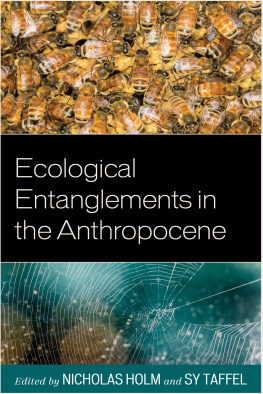
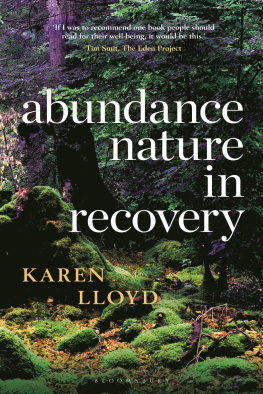
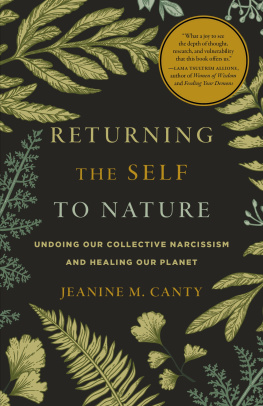
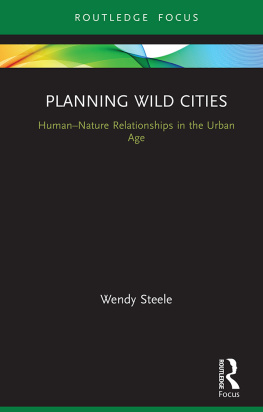
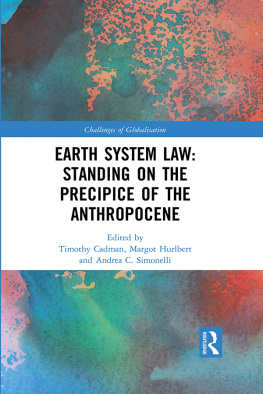
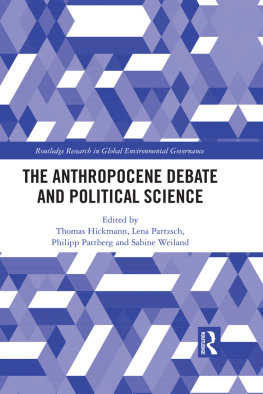
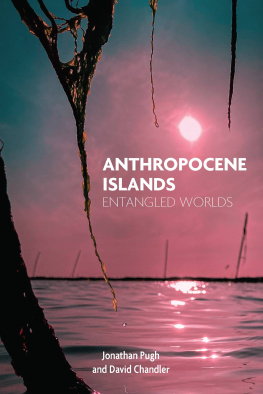
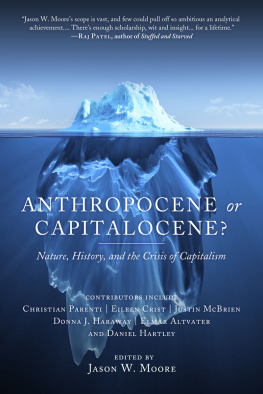
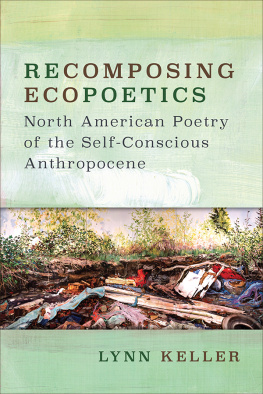

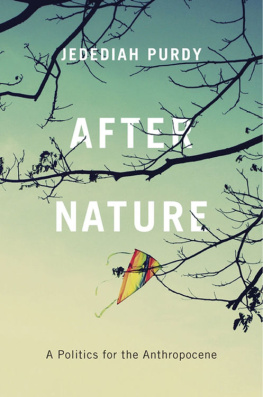
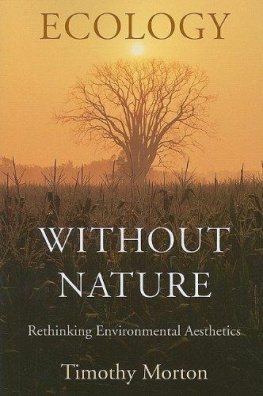
 The paper used in this publication meets the minimum requirements of American National Standard for Information SciencesPermanence of Paper for Printed Library Materials, ANSI/NISO Z39.48-1992.
The paper used in this publication meets the minimum requirements of American National Standard for Information SciencesPermanence of Paper for Printed Library Materials, ANSI/NISO Z39.48-1992.